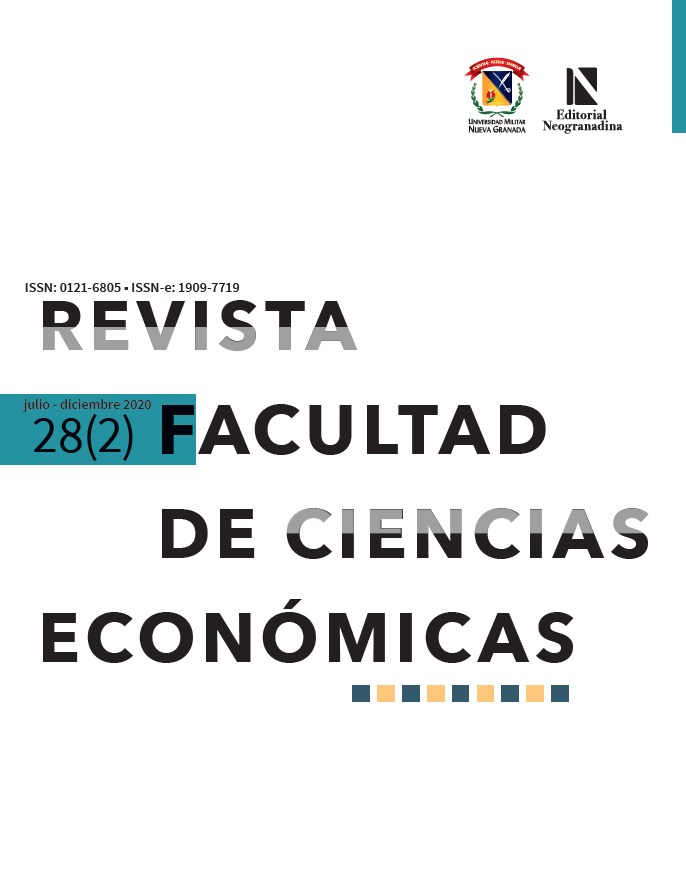Financial Education in Women
A Study in the López de Mesa District, Medellín
Abstract
Responsible financial decisions are part of an aspiration that enables people to adequately cope with their daily lives. Faced with this challenge, governments and different institutions have designed strategies for the population to be better equipped and informed when it comes to managing its available financial resources. Nonetheless, the academic literature shows that people’s characteristics act as control variables when explaining the existing gaps. Thus, this article highlights the relevance of the dimensions associated with the behavior, knowledge, and attitudes of women living in a district of Medellín. For this purpose, a structured questionnaire was employed, and the information analysis was carried out using descriptive statistics and contingency tables, in addition to a logistic model ordered for the level of knowledge. The behavioral results reveal great interest in paying debts on time and considering whether they can pay something before buying it. The results show a low financial indicator in the knowledge dimension, mainly in women with many children and no information on these issues. Attitudinally, married women with two or more children and a higher income have a more austere financial attitude.
Downloads
References
Agarwalla, S., Barua, S., Jacob, J. y Varma, J. (2015). Financial literacy among working young in urban India. World Development, 67(2013), 101-109.
https://doi.org/10.1016/j.worlddev.2014.10.004
Agresti, A. (2003). Categorical data analysis. Nueva Jersey: John Wiley y Sons.
https://doi.org/10.1002/0471249688
Atkinson, A., Monticone, C. y Mess, F. (2016). oecd/infe international survey of adult financial literacy competencies (Technical Report). oecd
Almenberg, J. y Dreber, A. (2015). Gender, stock market participation and financial literacy. Economics Letters, 137, 140-142.
https://doi.org/10.1016/j.econlet.2015.10.009
Azar, K., Lara, E. y Mejía, D. (2018). Inclusión financiera de las mujeres en América Latina. Situación actual y recomendaciones de política. Políticas Públicas y Transformación Productiva. Caracas: caf. Recuperado de http://scioteca.caf.com/handle/123456789/1162
Banco Mundial. (2013). Capacidades financieras en Colombia: resultados de la encuesta nacional sobre comportamientos, actitudes y conocimientos financieros. Washington: Banco Mundial.
Bannier, C. y Neubert, M. (2016). Gender differences in financial risk taking: the role of financial literacy and risk tolerance. Economics Letters, 145, 130-135.
https://doi.org/10.1016/j.econlet.2016.05.033
Bay, C., Catasús, B. y Johed, G. (2014). Situating financial literacy. Critical Perspectives on Accounting, 25(1), 36-45.
https://doi.org/10.1016/j.cpa.2012.11.011
Cameron, M., Calderwood, R., Cox, A., Lim, S. y Yamaoka, M. (2014). Factors associated with financial literacy among high school students in New Zealand. International Review of Economics Education, 16(pa), 12-21.
https://doi.org/10.1016/j.iree.2014.07.006
Cano, C., Esguerra, M., García, N., Rueda, L. y Velasco, A. (2014). Inclusión financiera en Colombia. Recuperado de http://www.banrep.gov.co/sites/default/files/eventos/archivos/sem_357. pdf
Comisión Intersectorial para la Educación Económica y Financiera, [cieef]. (2017). Estrategia Nacional de Educación Económica y Financiera de Colombia (eneef). Bogotá: cieef.
Coria, M., Cabezas, D., Páez, A., Vargas, M. y Aravena, J. (2009). Alfabetización económica en estudiantes universitarios de la carrera de psicología. Calidad en la Educación, 30, 234-249.
https://doi.org/10.31619/caledu.n30.179
Del Brío, E., López, C. y Veras, C. (2015). Educación financiera en la infancia. Propuesta didáctica en Educación Infantil. Ensayos-Revista de la Facultad de Educación de Albacete, 30(2), 99-122.
Driva, A., Lührmann, M. y Winter, J. (2016). Gender differences and stereotypes in financial literacy: Off to an early start. Economics Letters, 146, 143-146.
https://doi.org/10.1016/j.econlet.2016.07.029
Falahati, L. y Sabri, M. (2015). An exploratory study of personal financial wellbeing determinants: examining the moderating effect of gender. Asian Social Science, 11(4), 33.
https://doi.org/10.5539/ass.v11n4p33
Figueroa, L. (2009). Las finanzas personales. Revista ean, 65, 123-144.
Flores, L. y Simón, J. (2011). La educación financiera en estudiantes de educación básica. Un diagnóstico comparativo entre escuelas urbanas y rurales. Revista Ciencias Estratégicas, 19(25), 11-34.
Fullerton, A. (2009). A conceptual framework for ordered logistic regression models. Sociological Methods y Research, 38(2), 306-347.
https://doi.org/10.1177/0049124109346162
González, E. y Gómez, N. (2012). Las capacidades financieras de la población colombiana. Bogotá: Banco de la República.
https://doi.org/10.32468/be.725
Grigion, A., Mendes, K., Arruda, D. y Bender, R. (2015). Financial literacy in Southern Brazil: modeling and invariance between genders. Journal of Behavioral and Experimental Finance, 6, 1-12.
https://doi.org/10.1016/j.jbef.2015.03.002
Grigion, A., Mendes, K. y Kirch, G. (2018). How well do women do when it comes to financial literacy? Proposition of an indicator and analysis of gender differences. Journal of Behavioral and Experimental Finance, 17, 28-41.
https://doi.org/10.1016/j.jbef.2017.12.005
Grupo de Investigación R. E. D. (2017). Proyecto de Investigación: Aplicación de metodologías para el estudio de los fenómenos en los mercados financieros, fase I. Medellín: Tecnológico de Antioquia I. U.
Hahn, J., Jang, K. y Park, H. (2013). Financial literacy of Korean high school students. American Economic Association, 1-23.
Kiliyanni, A. y Sivaraman, S. (2016). The perception-reality gap in financial literacy: evidence from the most literate state in India. International Review of Economics Education, 23, 47-64.
https://doi.org/10.1016/j.iree.2016.07.001
Lusardi, A. (2008). Household saving behavior: the role of financial literacy, information, and financial education programs (N.o w13824). National Bureau of Economic Research.
https://doi.org/10.3386/w13824
Lusardi, A. y Mitchell, O. (2008). Planning and financial literacy: how do women fare? American Economic Review, 98(2), 413-17.
https://doi.org/10.1257/aer.98.2.413
Lusardi, A. y Mitchell, O. (2011). Financial literacy around the world: an overview. Journal of Pension Economics y Finance, 10(4), 497-508.
https://doi.org/10.1017/S1474747211000448
Mahdavi, M. y Horton, N. (2014). Financial knowledge among educated women: room for improvement. Journal of Consumer Affairs, 48(2), 403-417.
https://doi.org/10.1111/joca.12032
Mejía, D., Pallotta, A. y Egúsquiza, E. (2015). Encuesta de medición de las capacidades financieras en los países andinos. Informe comparativo 2014. caf. Recuperado de https://scioteca.caf.com/handle/123456789/743
Mihalčová, B., Csikósová, A. y Antošová, M. (2014). Financial literacy-the urgent need today. Procedia-Social and Behavioral Sciences, 109, 317-321.
https://doi.org/10.1016/j.sbspro.2013.12.464
Muccino, G. (2014). La educación financiera en la agenda internacional post crisis financiera 2008 (tesis de maestría). Universidad de San Andrés, Buenos Aires, Argentina.
Municipio de Medellín. (2018). Base de Datos Sisben 2017. Municipio de Medellín. Datos Abiertos Gobierno Digital de Colombia. Recuperado de https://www.datos.gov.co/Salud-y-Protecci-n-Social/Base-de-Datos-Sisben-2017-Municipio-de-Medell-n/cnr8-armb
Oggero, N., Rossi, M. C. y Ughetto, E. (2019). Entrepreneurial spirits in women and men. The role of financial literacy and digital skills. Small Business Economics, 55, 313-327.
https://doi.org/10.1007/s11187-019-00299-7
Ripley, B., Venables, B., Bates, D., Hornik, K., Gebhardt, A., Firth, D. y Ripley, M. (2013). Package 'mass'. Cran r, 538.
Sanders, C., Weaver, T. y Schnabel, M. (2007). Economic education for battered women: an evaluation of outcomes. Affilia, 22(3), 240-254.
https://doi.org/10.1177/0886109907302261
Schuhen, M. y Schürkmann, S. (2014). Construct validity of financial literacy. International Review of Economics Education, 16(pa), 1-11.
https://doi.org/10.1016/j.iree.2014.07.004
Sharif, S., Ahadzadeh, A. y Turner, J. (2020). Gender differences in financial literacy and financial behaviour among young adults: the role of parents and information seeking. Journal of Family and Economic Issues, 1-19.
Sohn, S., Joo, S., Grable, J., Lee, S. y Kim, M. (2012). Adolescents' financial literacy: the role of financial socialization agents, financial experiences, and money attitudes in shaping financial literacy among South Korean youth. Journal of Adolescence, 35(4), 969-980.
https://doi.org/10.1016/j.adolescence.2012.02.002
Swiecka, B., Yeşildağ, E., Özen, E. y Grima, S. (2020). Financial literacy: the case of Poland. Sustainability, 12(2), 700.
https://doi.org/10.3390/su12020700
Tovar, S., Vargas, S. y González, G. (2019). Importancia de la educación financiera para el desarrollo empresarial de la mujer rural. En D. Díaz, C. García, C. Pinzón, M. Angulo, C. Abadía y E. Rodríguez (Eds.), Impacto de la innovación y la gestión de las organizaciones (pp. 84-99). Bogotá:Sello Editorial unad.











